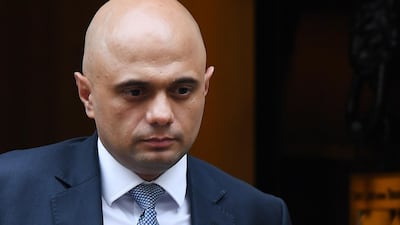All black and minority ethnic people are not the same. Who knew? Not the British press or politicians it seems. Not until this week when the country’s news coverage was flooded with commentary seeking to compare and contrast the UK’s new Home Secretary, Sajid Javid, with the Mayor of London, Sadiq Khan.
In fact things couldn’t possibly be more confusing for those who can’t see beyond stereotypes – and one dimensional depictions of brown and black people – because both Mr Javid and Mr Khan are the sons of Pakistani Muslim bus drivers.
Mr Javid, Conservative party MP, was appointed to one of the "great offices of state" on the back of the Windrush scandal in the UK. The disastrous affair has drawn accusations of structural racism within Tory policies.
Mr Khan, a Labour MP before becoming Mayor, was elected in 2016, defeating a Conservative party opponent accused of running a racist campaign.
While the origins of both men may appear similar on the surface, their politics couldn’t be more different. As a Labour politician, Mr Khan represents the received wisdom about the politics of ethnic minorities: left-leaning individuals fighting inequality and injustice.
And it’s true that the voting habits of black and minority ethnic groups in the UK were historically aligned with the Labour party.
But these groups are increasingly moving towards the Conservative party, fostered by the party itself in a bid to win key votes in key constituencies, as well as to try and dispel the toxicity that surrounds its reputation as the "nasty party" and its historic policies that have been labelled as racist.
The current Windrush scandal and the 2016 campaign against Mr Khan are both fuel for that fire.
After the 2015 general election, a study by Survation of voting habits showed a growing number of minority ethnic and Muslim voters being drawn to the Conservatives. Around one in three black and minority ethnic voters voted for the Conservative party, delivering around 1 million votes.
The attraction appears to be greatest for Asians, 38 per cent of whom voted Conservative, along with 21 per cent of black voters and 26 per cent of mixed race voters.
Some attribute the findings to the centre-right values of traditional Asian families – conservative, family-oriented, aspirational and self-starter philosophies. There is certainly something to that.
But digging into the numbers reveals a fascinating picture. When analysed by faith group, we see that 25 per cent of Muslim voters supported the Conservatives, alongside a huge 49 per cent of Hindus. Again, this should be no surprise as the Tory party has been proactively courting the Hindu vote, with huge disdain for Muslim voters. David Cameron’s campaign strategist in 2015, Lynton Crosby, allegedly advised the party should stop chasing Muslim votes, during a foul mouthed tirade.
Mr Cameron as prime minister, and Theresa May as both home secretary and prime minister, have demonstrated as much with actions rather than words. Earlier this year, Mrs May was campaigning with one of her MPs, Bob Blackman, who has played host to extremist Hindu Nationalist Tapan Ghosh, founder of Hindu Samhati, which defends the genocide of Rohingya Muslims in Myanmar.
So elevating someone who at least by name and heritage is Muslim to the role of home secretary is an interesting choice and perhaps a culmination of the policy of playing good Muslim, bad Muslim in the Conservative party.
Mr Javid has openly stated that he is not Muslim, that the religion in his household is Christianity, as it is across the wider UK.
To be frank, whether he is a practising Muslim or not is neither here nor there. The Conservative party does not face elections on piety, but rather on policy. Having said that, the face of those policies makes a difference.
One of the challenges Mr Javid will face is to demonstrate that he hasn’t been put into this role precisely because he is of an ethnic minority background and a Muslim, as a way of deflecting criticisms of racist policies
But the shift Mr Javid’s appointment highlights is that the increasing number of black and minority ethnic voters turning to the Conservatives is a class issue. What parties will need to deal with – and what the communities themselves have not realised – is that those formerly consistent voter blocs are starting to stratify.
And so the change to be dealt with is the fragmentation by class of ethnic and religious groups. Mr Javid's own story in the upper echelons of the financial industry, working at Chase Manhattan and as a director at Deutsche Bank, is testament to that.
Or, to put it another way, Muslim experiences and politics are as diverse as everyone else’s, and class is a significant issue among UK voters. Who knew?
Shelina Janmohamed is the author of Love in a Headscarf and Generation M: Young Muslims Changing the World


